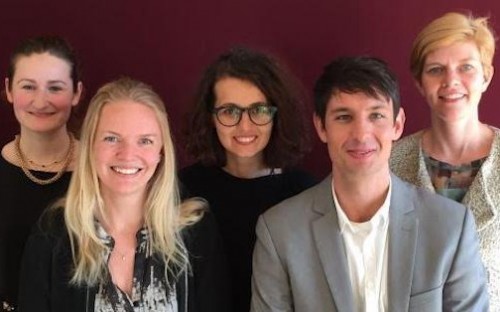After almost a decade working in engineering for giants like Glencore, Matthew decided to uproot and explore job opportunities in Scandinavia – a business environment famed for its flat hierarchies, work-life balance, and focus on sustainability and responsible management.
When considering business schools, he looked beyond top-ranked schools in the US and the UK, for an MBA program that was the right fit for him. Copenhagen Business School’s one-year MBA – with its focus on entrepreneurship, leadership, and responsible management – stood out.
Out of the MBA’s intimate, 35-to-40 student class, over 90% of students are international. In 2014, 80% of Copenhagen MBA students landed jobs in Denmark after graduation.
After his MBA, Matthew got a job in the school’s admissions department. Now, he’s on the other side of the desk in the MBA admissions interview room. His advice for MBA applicants looking to stand out? Be yourself.
Why did you decide to pursue the Copenhagen MBA?
It was love at first sight! Everything the program offered was exactly what I was looking for, especially the core pillars in Responsible Management, Entrepreneurship and the Leadership Discovery Process. Being a one-year program with a small class size was also appealing.
Copenhagen is an easy sell too! I believe the Danes are global leaders on so many levels and this comes from their quality of education and passion to make a positive impact. I also think you are the average of the five people you spend most of your time with. It was a no brainer to surround myself with inspiring people.
Why did you choose Denmark over an MBA in the US?
There are many good schools and programs out there. As an Australian, we like the US and the UK and other masculine societies (according to Hofstede). I have lived in Sweden and the Netherlands previously (feminine societies) and hence grew an interest in their way of thinking, living and leadership traits.
Furthermore, these social welfare states are brilliant facilitators of entrepreneurship because it promotes risk taking with a safety net. When you combine this with social cultures that care about impact then you see many great ideas flourishing. I could only see myself post-MBA working in Scandinavia also.
How have you profited from the Copenhagen MBA?
There is no better feeling then being confident in your skills, leadership style and decision making abilities. These are all self-awareness and soft skills that were developed during the Copenhagen MBA program. The Leadership Development process allows us to embark on an individual leadership journey where we learn how to lead ourselves first and sharpen our personal style.
I am using the learnings from these experiences on a daily basis; in my career, personal life and professional leadership situations. I feel confident that whatever challenges arise in the future, I am equipped to tackle them head on.
How can applicants stand out in an MBA admissions interview?
There are many applicants so think of a few key points that distinguish you. If candidates can already sell the program, school and location to themselves, then they have made good headway. Big no-noes include text book answers, lack of open-mindedness, references that have ‘perfect evaluations.’
The best advice is to make sure you have an alignment and fit with the school and show us your true self. The hard factors are important, but so are the soft elements. We prefer to build relationships with our students too and therefore this is always a good place to start.
What should applicants think about when deciding to do an MBA?
Finding the business school that’s the best fit for you is about finding an alignment between four key ingredients: the admissions process, the MBA program, local culture and society, and opportunities for career development.
Reach out to school representatives and develop insight on their expectations. What is most exciting about the program? This is a sign that you will maximize your investment. What is it about the local environment that inspires you? Local values will influence you as a developing business leader.
MBA’s help increase our skills, jump higher in our careers, move sideways, or start our own companies. If you can leverage your background, combine that with an MBA, and have realistic career ambitions, you will stand out in the jobs market.
What are your plans for the future?
I made a transition from civil engineering to an environment which I find extremely inspiring here at Copenhagen Business School. I see myself continuing in a direction which combines both the technical and people aspects, whilst demonstrating a positive impact to society!
RECAPTHA :
1b
44
e5
e6








